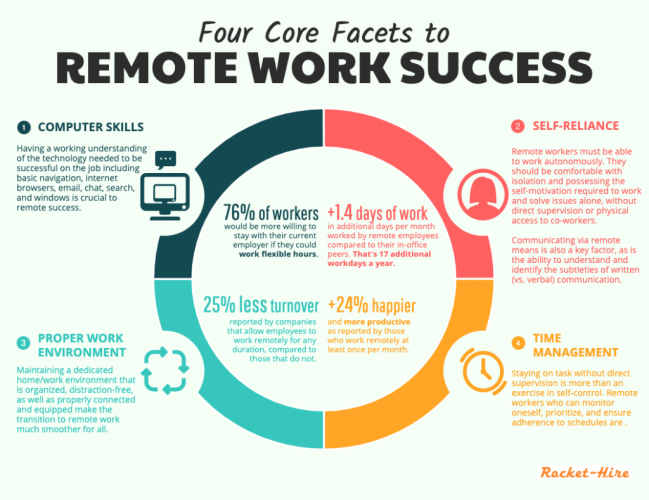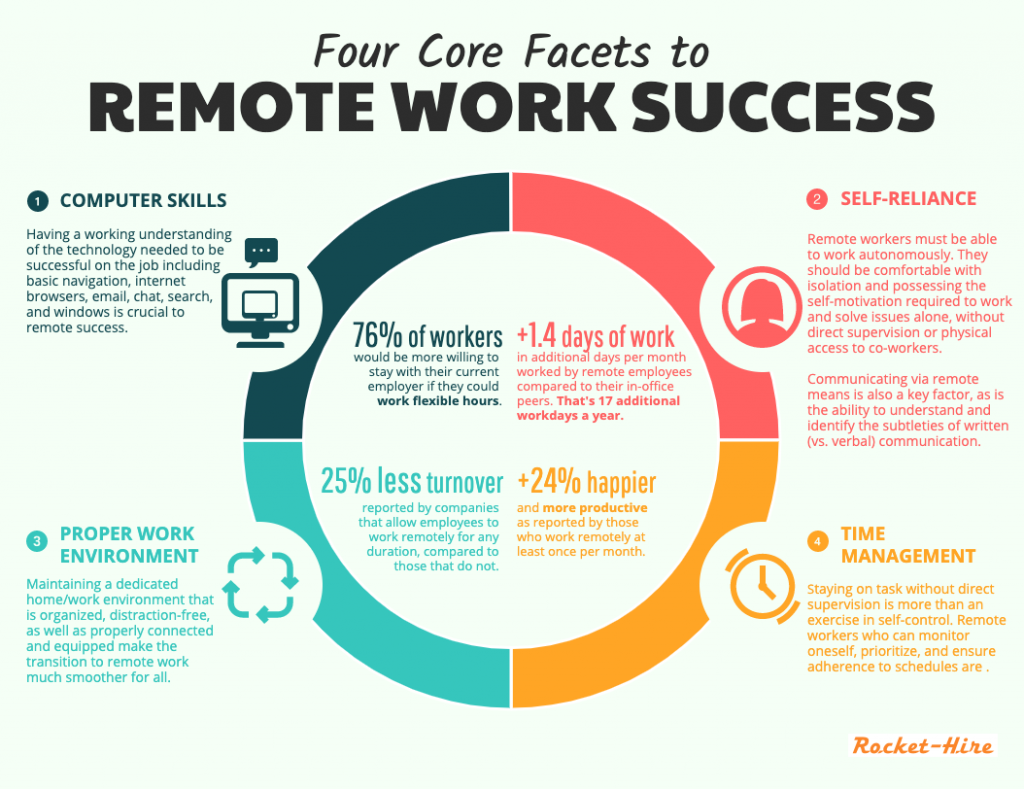
What's The Role Of IT Services In Remote Work?
As remote work becomes more prevalent, the role of IT services becomes increasingly essential. So, what's the role of IT services in remote work? Let's find out!
In today's digital age, IT services play a crucial role in enabling smooth and efficient remote work. But what exactly does that mean?
From providing secure access to company resources to ensuring that technology runs seamlessly, IT services are the backbone of remote work success. So, let's explore how IT services support and empower remote workers in achieving their professional goals.
When it comes to remote work, IT services play a crucial role in ensuring smooth operations and efficient productivity. IT services provide technical support, network security, and troubleshooting to remote employees. They enable seamless communication through virtual meetings and collaboration tools. Moreover, IT services help in data backup and recovery to protect important files. Overall, IT services act as the backbone of remote work, keeping employees connected, productive, and secure.

The Role of IT Services in Remote Work
In today's digital age, remote work has become increasingly common. With the advancements in technology, employees are no longer confined to a physical office space and can work from the comfort of their homes or any location of their choosing. However, to facilitate effective remote work, the role of IT services has become paramount. From providing secure access to sensitive data to ensuring seamless communication and collaboration, IT services play a crucial role in enabling remote work. In this article, we will explore in detail the various aspects of IT services and their role in supporting remote work.
The Importance of Cybersecurity in Remote Work
One of the primary concerns in remote work is the security of sensitive data. With employees accessing company resources from various locations and devices, the risk of data breaches and cyberattacks increases significantly. This is where IT services come into play, providing robust cybersecurity measures to protect the organization's data and systems. IT professionals employ a range of tools and techniques, such as firewalls, encryption, and multi-factor authentication, to ensure secure remote access. They also educate employees on best practices for maintaining cybersecurity, such as regularly updating passwords and being vigilant about suspicious emails or links.
Moreover, IT services play a crucial role in monitoring and detecting potential security threats in real-time. They employ advanced intrusion detection systems and network monitoring tools to identify any suspicious activities or breaches. In the event of a security incident, IT professionals can swiftly respond and mitigate the impact, minimizing the disruption to remote work operations. By prioritizing cybersecurity and implementing robust IT services, organizations can foster a secure remote work environment.
Enabling Seamless Communication and Collaboration
Effective communication and collaboration are vital for remote teams to work cohesively and achieve their goals. IT services provide the necessary tools and infrastructure to enable smooth and hassle-free communication among remote employees. Instant messaging platforms, video conferencing software, and project management systems are some of the tools utilized to facilitate communication and collaboration. IT professionals configure, maintain, and troubleshoot these platforms to ensure reliable and seamless communication.
Furthermore, IT services play a crucial role in setting up virtual collaboration spaces. With the help of cloud-based applications and file-sharing platforms, remote teams can access and collaborate on documents in real-time. These platforms enable version control, allowing multiple users to work simultaneously on a document and track changes efficiently. By providing the necessary IT infrastructure and support, organizations can empower remote employees to communicate effectively and collaborate seamlessly, regardless of their physical locations.
Overcoming Technical Challenges in Remote Work
Remote work often poses technical challenges that require the expertise of IT services to overcome. As employees work from various devices and locations, compatibility issues may arise. IT professionals ensure that the necessary software and applications are compatible with different operating systems and devices. They also provide technical support to resolve any issues or glitches that remote employees may encounter, ensuring uninterrupted workflow.
Additionally, IT services play a crucial role in maintaining network stability and performance. They employ techniques such as load balancing and bandwidth optimization to prevent network congestion and ensure smooth access to company resources. Moreover, IT professionals conduct regular maintenance and updates to keep the IT infrastructure running efficiently and minimize disruptions to remote work operations. By addressing technical challenges and providing prompt support, IT services enable remote employees to work seamlessly and efficiently.
The Benefits of IT Services in Remote Work
IT services bring numerous benefits to remote work environments. Some of the key advantages include:
- Enhanced cybersecurity and protection of sensitive data
- Efficient communication and collaboration among remote teams
- Faster resolution of technical issues and glitches
- Improved network stability and performance
- Access to the latest technology and tools for remote work
- Increased productivity and efficiency for remote employees
The Role of IT Services in Remote Work: Tips for Success
To maximize the benefits of IT services in remote work environments, organizations can follow these tips:
- Invest in robust cybersecurity measures and regularly update security protocols
- Provide training and education on remote work best practices and cyber hygiene
- Keep communication channels open and encourage frequent collaboration among remote teams
- Ensure remote employees have access to reliable internet connections and necessary hardware
- Regularly assess the IT infrastructure and make necessary upgrades to support remote work
The Future of IT Services in Remote Work
As remote work continues to gain prominence, the role of IT services will become even more critical. Organizations will need to invest in advanced technologies and expert IT professionals to support the growing demands of remote work. From implementing artificial intelligence solutions for enhanced cybersecurity to leveraging virtual reality for immersive remote collaboration, the future of IT services in remote work holds immense potential. By staying abreast of technological advancements and adapting to changing work environments, organizations can harness the full benefits of IT services in enabling remote work.
Key Takeaways: The role of IT services in remote work
- IT services play a crucial role in ensuring smooth remote work operations.
- They provide technical support to remote employees, addressing any issues or concerns.
- IT services enable secure and efficient remote access to company systems and data.
- They facilitate effective communication and collaboration among remote teams.
- IT services help in maintaining network and data security for remote workers.
Frequently Asked Questions
Welcome to our FAQ section, where we answer common questions about the role of IT services in remote work. Whether you're a remote worker or a business owner exploring the benefits of remote work, we've got you covered. Read on to find out how IT services play a crucial role in enabling smooth and secure remote work operations.
Q: How do IT services support remote work?
IT services provide essential support for remote work by ensuring that employees have a seamless and secure connection to company resources. They set up and maintain the necessary infrastructure, such as virtual private networks (VPNs), to enable employees to access files, applications, and systems from anywhere in the world. IT services also play a vital role in troubleshooting technical issues and providing remote technical support to employees when problems arise.
Furthermore, IT services implement robust security measures to protect sensitive data and keep remote work environments secure. They deploy firewalls, encryption, and multi-factor authentication systems to defend against cyber threats and unauthorized access. Overall, IT services act as the backbone of remote work, providing the necessary tools, support, and security for seamless productivity.
Q: What are the benefits of IT services in remote work?
IT services bring numerous benefits to remote work setups. Firstly, they ensure that employees have access to all the tools and resources they need to perform their tasks efficiently, regardless of their location. Whether it's accessing files, collaborating on projects, or attending virtual meetings, employees can rely on IT services to provide a seamless digital work environment.
Secondly, IT services enhance data security in remote work scenarios. They implement robust security measures to protect sensitive information, such as customer data or trade secrets, from cyber threats. This gives both employees and employers peace of mind, knowing that their valuable data is adequately protected even when working remotely. Additionally, IT services regularly update software and systems to fix vulnerabilities, ensuring a secure remote work environment.
Q: How do IT services troubleshoot technical issues in remote work scenarios?
When technical issues arise in remote work scenarios, IT services step in as the problem solvers. Remote employees typically have access to IT support through various channels, such as email, chat, or phone, allowing them to report technical issues promptly. IT services then analyze the problem and provide remote assistance, guiding employees through troubleshooting steps or resolving the issue remotely.
Using remote access tools, IT technicians can connect to employees' devices to diagnose and fix technical problems directly. They can perform software updates, resolve network connectivity issues, or address software glitches without physically being present. The goal is to minimize downtime and ensure that employees can resume their work as quickly as possible.
Q: Can IT services help with training and onboarding remote employees?
Yes, IT services can play a role in training and onboarding remote employees. As part of their support, IT services can provide remote training sessions through video conferencing or online learning platforms. They can guide new employees through the setup process, familiarize them with the remote work tools and software, and address any technical questions they may have.
Moreover, IT services can help set up user accounts, configure email and messaging systems, and ensure that new employees have access to all the necessary resources to get started. By providing comprehensive technical support during the onboarding process, IT services contribute to a smooth transition for remote employees and help them quickly become productive members of the team.
Q: What role do IT services play in maintaining data security in remote work environments?
IT services are at the forefront of maintaining data security in remote work environments. They implement several measures to safeguard sensitive data and protect against potential threats. This includes setting up secure remote access systems, implementing data encryption, and deploying firewalls and antivirus software.
IT services also monitor network activity and configure intrusion detection systems to identify and respond to potential security breaches proactively. Regular security audits and updates are performed to address any vulnerabilities and ensure that remote work environments remain secure. By taking a proactive approach to data security, IT services play a significant role in minimizing risks and protecting valuable information for remote workers and businesses.
Summary
IT services play a crucial role in remote work by providing essential support and enabling smooth operations. They help in setting up secure connections, troubleshooting technical issues, and maintaining digital infrastructure. With IT services, employees can access necessary tools and resources, ensuring productivity and effective collaboration from any location. Additionally, IT services also focus on safeguarding data and systems, protecting against cyber threats and ensuring data privacy. Overall, IT services are indispensable in remote work, ensuring a seamless and secure digital environment.
In conclusion, IT services enable remote work by providing technical support, facilitating communication, and ensuring the security of data and systems. They empower employees to work efficiently from remote locations and enable businesses to thrive in the digital age. So, whether it's troubleshooting a computer problem or accessing files from home, IT services play a vital role in making remote work possible and successful.
Recent Posts
- How Does GPON Improve Network Efficiency?
- What Are The Advantages Of GPON?
- What Are The Benefits Of IT Outsourcing?
- What's The Deal With Ransomware Attacks?
- Are GPON Providers Widely Available?
- What's GPON's Impact On Bandwidth?
- Why Is Multi-Factor Authentication Important?
- How To Ensure Data Privacy Compliance?
 Blogs
Blogs Infographics
Infographics Videos
Videos Podcasts
Podcasts Case Studies
Case Studies Call For Quote
Call For Quote